There are few undebatable facts in economics, and far fewer that even deserve any mention, but if there is one trend I want to impress upon you the most, it is visible in this single chart:
“A central tenet of a free enterprise market economy is limited government. In this limited role, the government protects and ensures property rights, individual freedoms, economic opportunity, and competitive markets largely through an agreed-upon and enforceable set of rules. Government also has a limited role in addressing the provision of goods and services not provided by the private market, and in addressing the by-products of one person’s or entity’s behavior on another’s well-being.”
Private Enterprise Research Center – Is There a Limit to Government? (tamu.edu)
This means half of all financial, and therefore political decisions are made by the govt, which was designed to allow a free society, but can it really be free?
Govt Spending as a % of GDP: National, State, & Local
Let’s add in local data. The only source I could find with a nice chart was Wikipedia, however, it is only as of 2018, at leaves out the 2020 spike.

If you cannot tell from the above, there appears to be zero chance that govt spending will cease to grow as a share of the economy anytime soon.
And remember, if you think this is a partisan issue, you are wrong:
Government Spending by Year (Charts)
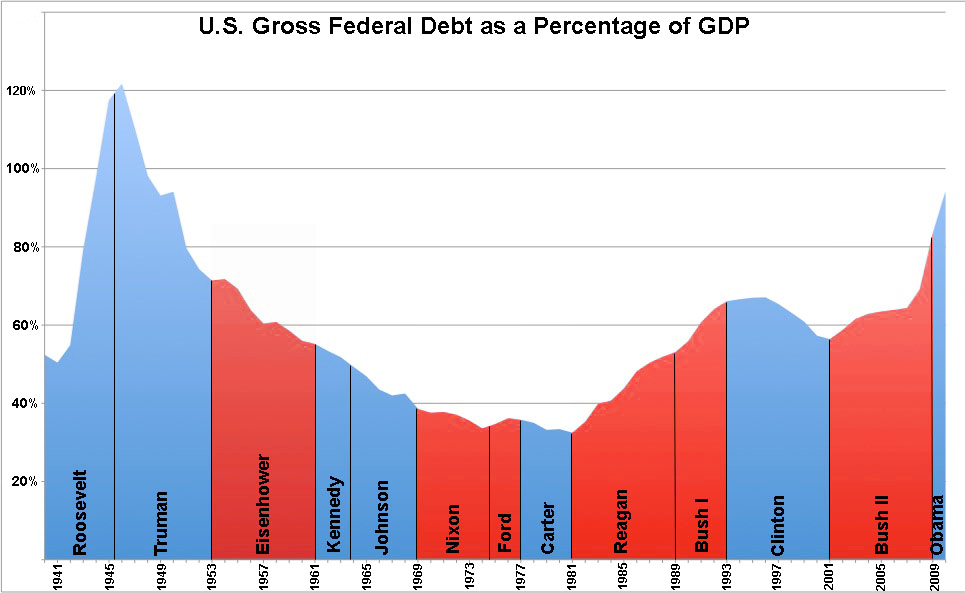
Unfortunately, I have no newer charts for this.
Why is US Government Debt Growing?
In the past, at least war explained debt, but not today:

So, if debt is growing, and there are no major wars, then it gets more difficult to explain, but it is likely a combination of military spending growth, and mostly social programs. But the bigger question is and what will happen the debt when we do have the next war? At some point, if we have enough financial issues, then the US might not be a very desirable place to live, but considering it is more free than most, I expect that radical social changes are most possible, although not necessarily likely, here.
Government Spending to GDP – 2022 (& Future Projections)
Here is some more recent data along with some projections:
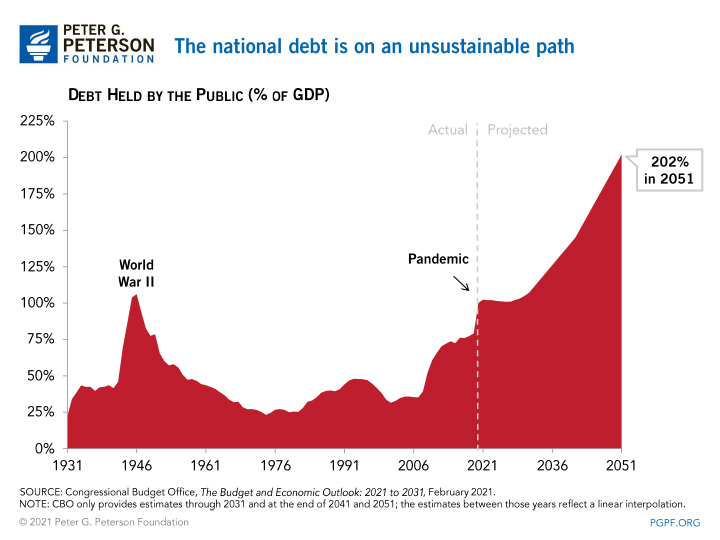
How Do Taxes Then Relate to Govt Spending?
Simple. The government currently spends far more than they tax. All you need to do is look as the national debt over the last 100 years.
Debt creates an illusion which in reality is spending the future, and the debt to GDP ratio has no end in sight. In fact, no modern Western country in the world is immune to the global debt bubble that grows yearly. There is no way out when your society is aging with few workers to replace the youth.
Oh wait, I forgot to mention the coming robots. It’s hard to measure the impact these will have, positive or negative, but time will soon tell. If they displace the young workforce, then those countries that adopt them first will recover for a time in theory, but there are lots of social and economic barriers to such, as I discuss elsewhere on this site.
What is the Largest Contributor to Government Spending Today? Social Programs
France’s budget shows the typical breakdown of social service segment spending over time.

If you did not spot the “old” as being the fastest growing segment, then let me just point that out. Aging populations is the single largest cause of govt spending growth. So what does this say about the future where the average age in America, and much of the developed world, is quickly heading towards retirement age?
Solutions to Govt Spending Growth
One of the most common debates online is whether three groups should be taxed. Companies, the wealthy, and churches, but how many voices regularly call for a reduction in govt spending? Unfortunately, the laws of the land have no limits on govt usurpation of spending. The problem is not taxes. It is spending. It will always be the case.
This of course does not even include the fact that on top of govt spending that the very same govt is also Using Our Money To Steal Our Money via interest rates and inflation. A.k.a. financial repression, which has a long history unbeknownst to many. This is why some believe we should simply end the Fed. I am not opposed to the idea as I once was.
International Govt Spending to GDP
The government spending by country situation is not much better in most Western countries.
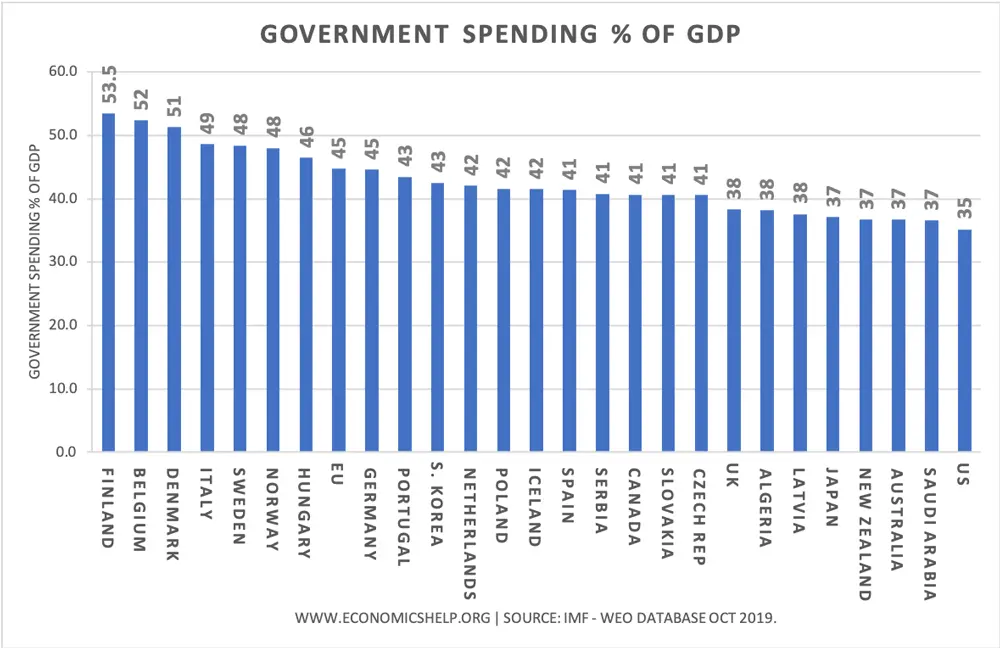
Here is a visual map version of the same:

Again, the most common variable seems to be aging societies. Here is my chart demonstrating the high correlation. 64% to be exact, which is nearing a moderately high correlation.
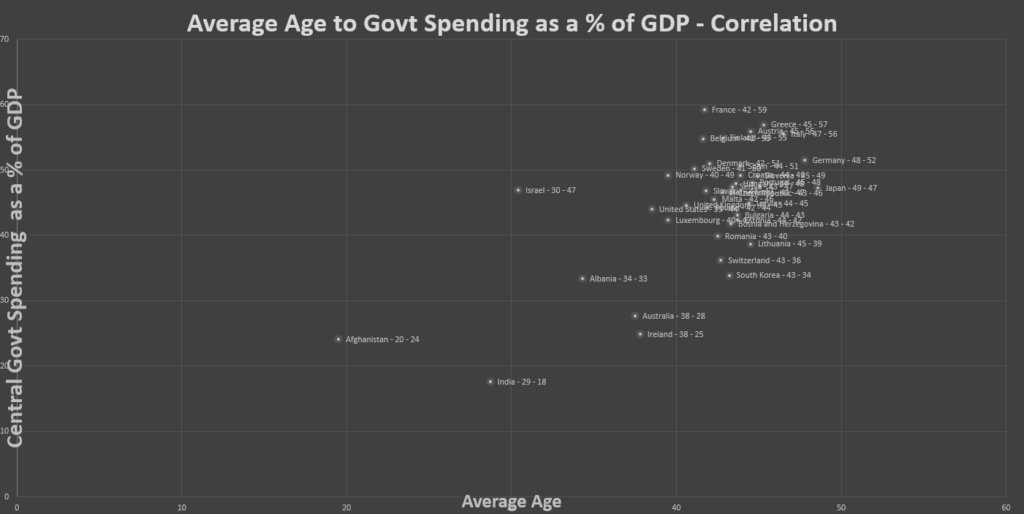
This provides the largest view of public social spending over time for major countries.
As social programs grow, is there a top limit, and is the world really better off, or is it just more disconnected, global, and bureaucratic?
On the same, yet somewhat tangential note, could such programs be fueling the slow decline of civilization through subsidizing of negative fertility patterns?

Sure, some of that is logical since younger families have lower incomes, but that under $10k category seems awfully high. However, this may be changing “There’s a longstanding assumption in economics that richer families have fewer kids. The U.S. Census data studied by Bar corroborates that relationship — but it also shows that it might be changing. According to the research, the poorest families exhibited a fertility rate 27 percent higher than the richest families in 2010. That difference was more than 62 percent in 1980.” (source)
How Much Should Governments Spend as a % of GDP?
Let me close with a statement from Benjamin Franklin “It would be thought a hard government that should tax its people one tenth part of their time, to be employed in its service. ” Yes, 10% in taxes would be considered really high in his time, but why should it be different today? Some think we couldn’t get along without govt spending on infrastructure and services. I mean what would people do without firefighters and public schools? the same thing we did a century ago and still do in some places today: volunteers. Surely, infrastructure could not be managed by private markets you say. Well, perhaps you need an introduction to the fastest growing sub-culture in the US, one that single-handedly is building some of the fastest growing commercial markets in their areas, like Belize. In fact, I have travelled on the very nice roads they built with their own hands, all without govt money.
Look at the breakdown of govt spending over time by mandatory and discretionary spending:
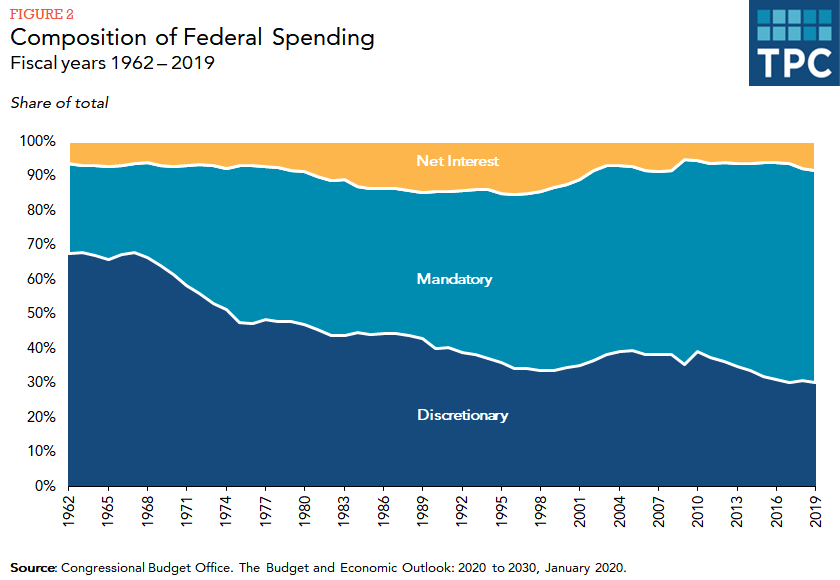
Mandatory spending are programs that require a law to change them, which include essentially the social programs like Social Security, Medicaid/Medicare, unemployment, and since its easy to view them this way, the above chart shows a clear direction. The future trends are clearly much worse than today especially as the baby boomers retire.

How Rising Interest Rates with Current Spending Levels Could Bankrupt the US
With so much debt, a small rise in interest rates will cause debt, esp. short term debt, to become very expensive.

“Relative to the size of the economy, interest will double from 1.6 percent of GDP in fiscal year 2022 to 3.3 percent in 2032, which would be the largest ratio since at least 1940 (the first year for which the Office of Management and Budget reports such data).”
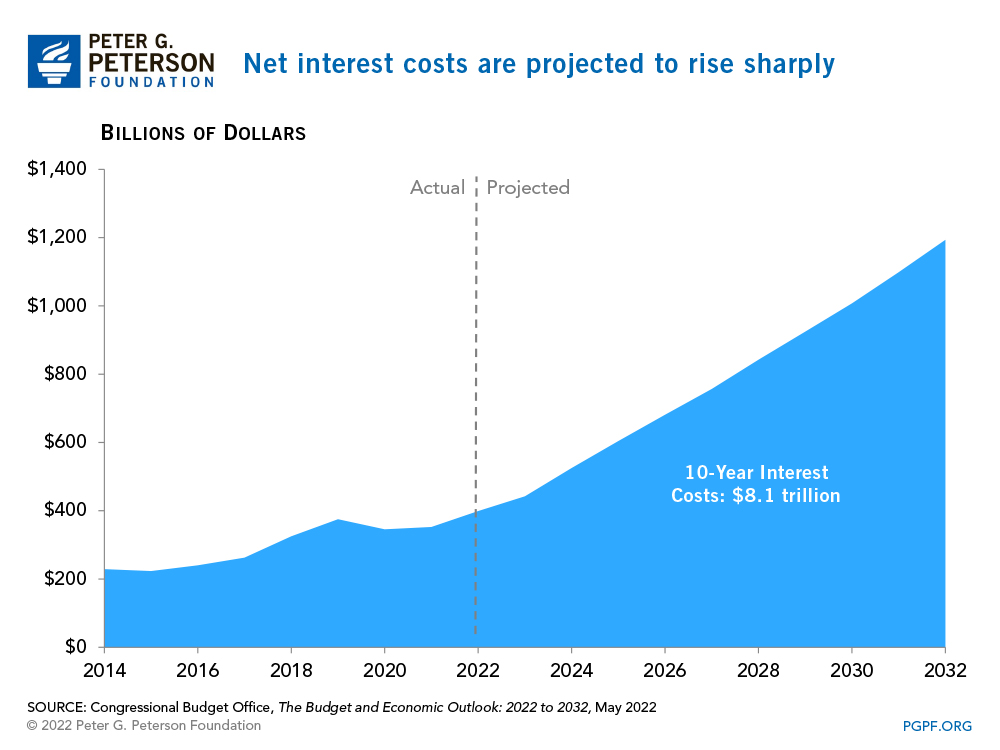
By 2022, the Congressional Budget Office estimates that the federal government’s interest payments will be higher than the budgets of entire departments such as veterans’ benefits, transportation, and education. In a few years, it may exceed all categories of spending.

It is true though that for a time, if the US risks eliminating debt via inflation that other countries will no longer see the US as a safe haven for debt, treasuries, etc… I detail all this on the front of this this site in my pillar series.
Could We Live with Far Less Government Spending Than We Have Today?
The Amish reject social security, Medicaid and Medicare, which constitute the bulk of the social programs, especially the growing parts, and take care of their own. Unemployment is unheard of, and I doubt there are any starving.
In other words, their family-centric community reigns supreme in the Amish society. When the world is falling apart, they will just keep chugging along for the most part because of their self-sufficiency. Regardless what happens to the global economy, I suspect they will do relatively well, like during the 2008 crash. Not sure about the rest of us though. Sure, they do need govt protection and freedom to practice their religion at a minimum, which is largely why they have kept fleeing to different countries historically (e.g. Holland, Russia, etc…), but such protection of religion is indeed one of the useful jobs of govt.
True, roads of the Amish may not be paved, but playing the long game is always more important than playing the who can be the biggest super-power first game. Besides, a private toll-road is logically always more efficient than a govt maintained one, as long as competition is permitted and monopolies prevented. Oh, but the Amish have to work so hard you complain? Maybe that is actually the answer to lots of our other problems today.
High Government Spending Leads to Tyranny
In case it is not obvious by now, the more a government spends as a percentage of the economy, the more likely it is tyrannical. Some say that communism is radically different than socialism, but the reality is, even if the govt. does not directly intervene in a market, they indirectly intervene through high taxation and
